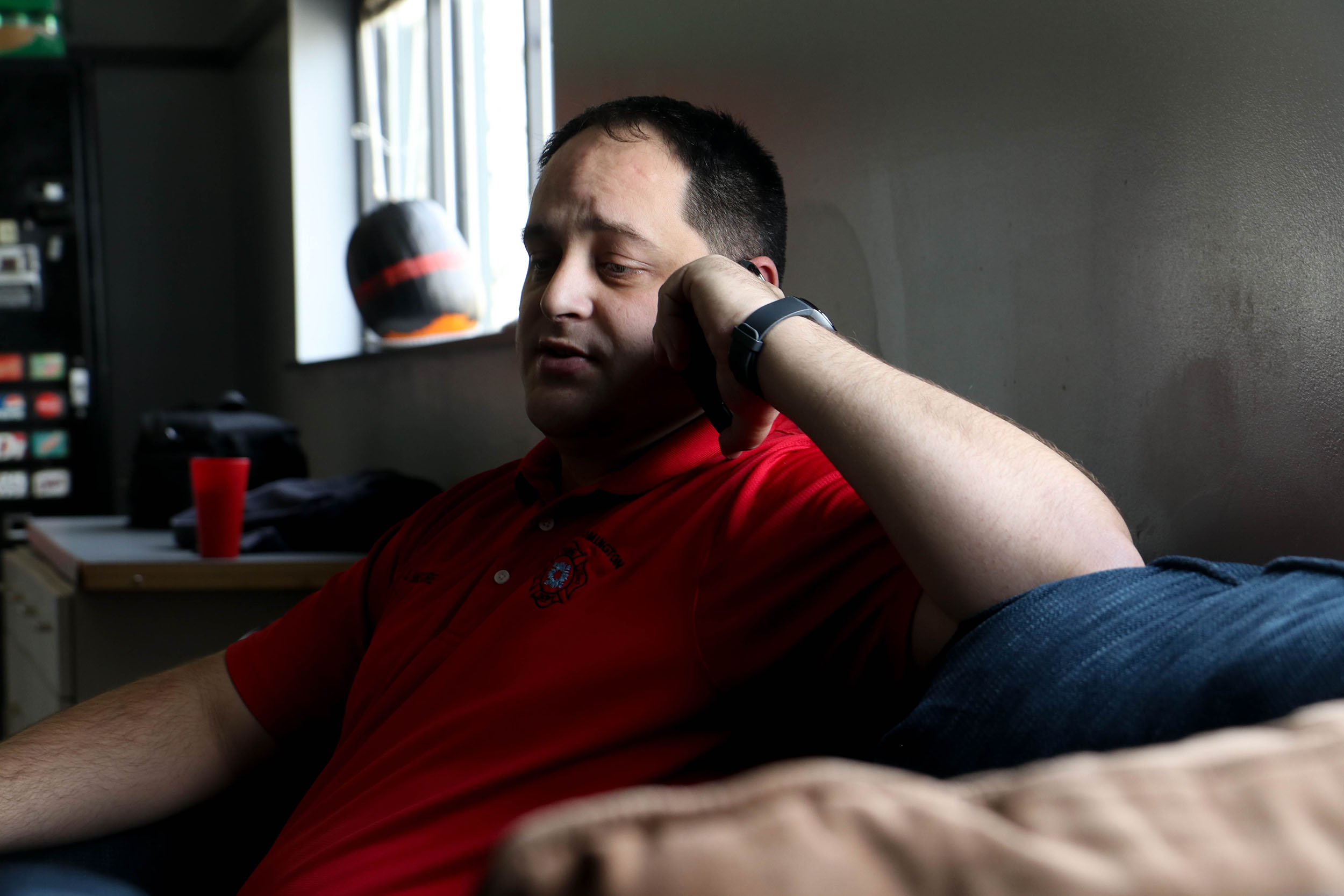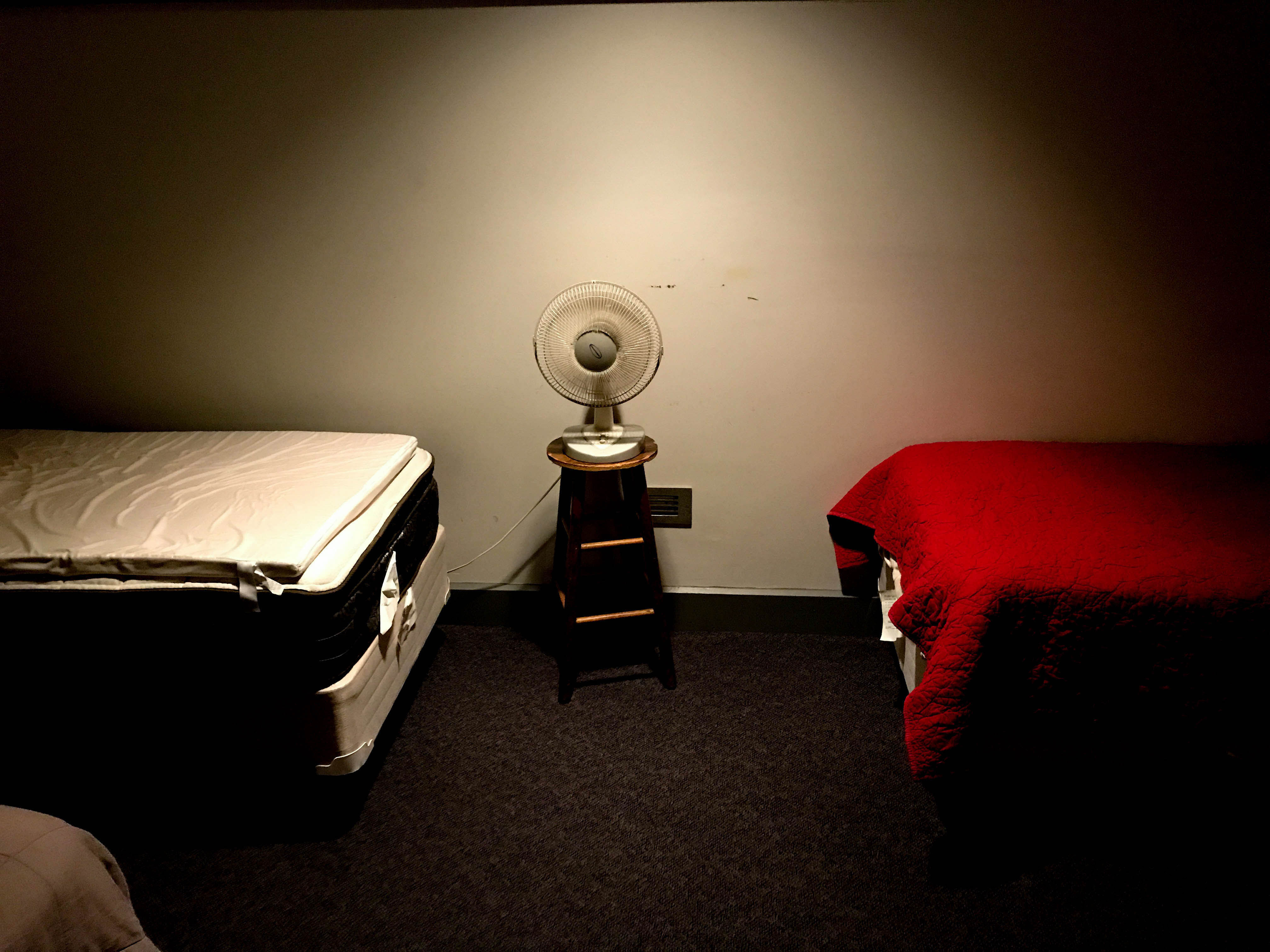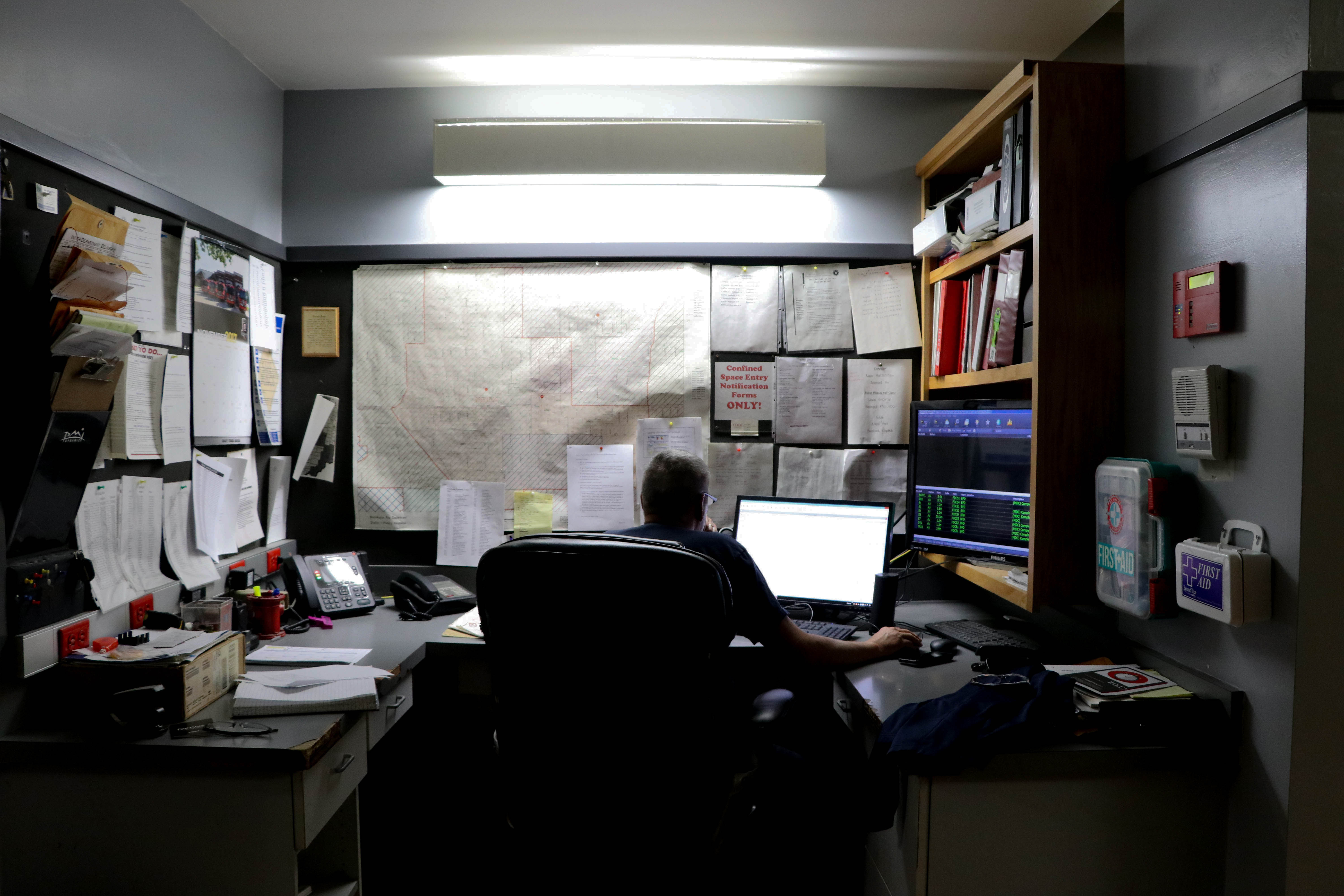

Every time the retired Bloomington Fire captain drives past the curve on State Road 46, she thinks of the three teenage girls who died there.
Jean Magrane remembers arriving at the scene of the head-on collision near Brummetts Creek Road that spring afternoon. She pictures their bodies strewn out on the road — one thrown from the Chevy Cavalier, the other half caught between the pavement and its mangled frame, the third still stuck inside.
Twelve years have passed, the roadside crosses have come and gone, but for Magrane the image remains, tucked away with other memories of runs during her 27 years of fire service.
She can recall the faces of dead infants. The peeling skin of a man pulled from a house fire. The body of a man ejected from his car, found sitting upright against a tree.
In those moments, spurred by adrenaline and the familiarity of protocol, visions of twisted limbs, human flesh or faces constricted in pain didn’t seem to register with her. She could only think of the job at hand.
It was when the run was over that the visions started to haunt.
* * *
When we have a problem we call the fire department. From defective smoke alarms, kitchen fires, to severe medical emergencies — when we call, firefighters respond.
But who do firefighters call for help when the emotional toll of the job becomes too much to handle? Who helps the caretakers take care of themselves?
The fire service is a line of work tasked with helping others. It is also one which, despite the increased presence of women, remains predominantly male. Customary ultra-masculine stereotypes of toughness end up factoring into a reluctance to admit to struggling with mental health.
“In our profession, we are supposed to help everyone,” Bloomington Fire Chief Jason Moore said. “It’s really hard to admit we need help.”
Moore is trying to change that.
“In our profession, we are supposed to help everyone.Jason Moore, Bloomington fire chief
It’s really hard to admit we need help.”
Scribbled on the whiteboard in his office at the top of his list of things to do is “peer and professional support group.” It was the first thing he wrote down when he took the job two years ago, when, during his first week as chief, the crew responded to a call where a six-month-old baby died.
In Moore’s eyes, the program would bring together firefighters and medical professionals to help people who might be struggling find ways to cope with stress or grief. Crew members would be trained on how to notice warning signs in their colleagues and, if they feel they need further counseling, how to gently suggest they speak with a mental health specialist partnered with the station.
He hopes having a professional system in place will get more men to open up, and in turn keep them from reaching their breaking point.

Moore was first introduced to the idea of a support program while working at a station in Charleston, South Carolina. Two months after he started, nine firefighters died while on a call for a warehouse fire in a Sofa Super Store. The deaths of the “Charleston 9” launched a peer support initiative by the station to help employees cope.
He himself would come to use the services months later. While responding to a call for an ATV accident, Moore held the hand of 16-year-old boy as he died en route to the hospital. When he returned to the station, three veteran firefighters were waiting outside. One of them was then-active Battalion Chief John Winn Sr.
He hugged Moore. He told him he wasn’t there to pry, just to talk if he felt like it. “Don’t go home and let this sit on you,” Winn said. “You’re not alone.”
He gave Moore his card and said, “You don’t know you’re going to need this yet.”
* * *
On every third day, firefighters at Bloomington headquarters begin a new shift — 24 hours on, 48 hours off — from 7 a.m. until 7 a.m. the next morning. One by one they file in, say hello to Berniece at reception and hang up the protective gear and boots of the person they’re relieving. The engine and ladder truck are inspected and cleaned and test dispatch tones drop at 7:15 a.m. for a city-wide radio check.
For 24 hours their lives are stop and go. A dispatch call can drop at any moment, and when it does, it interrupts daily routines. One goes and deals with the issue and comes back: reheating a meal, repeating an exercise set or picking up a conversation, all exactly where they left off.
The fire station is their home base. It’s where Friday nights are pizza night and Sunday mornings mean biscuits and gravy for breakfast. Where the men spend evenings relaxed in recliner chairs, watching TV or catching up on sleep. Some call home to say goodnight to their kids. Others meet downstairs in the training room, amidst CPR dummies, for nightly Bible study.

Many of the men spend more time at the station in a given week than they do with their wives and children. As firefighter Gabe Morran says, the crew isn’t just working together, it's living together. It becomes family.
Firefighters field any 911 call dispatched to the station, from structure fires to shortness of breath. Emergency response squadrons are always accompanied by law enforcement, but sometimes firefighters arrive on scene first.
What awaits them can be a moment of either life or death. Some overdose victims still have the needle in their arm, and some still wear hospital tags from their most recent ER visit.
That’s why, before leaving for any run, Sgt. Brandon Hudson tells his crew: “watch for needles.” God forbid someone gets stuck.
With each case, the men usually never find out what happens to the patient after they’ve been loaded into the ambulance. Because of HIPAA confidentiality laws, they can’t simply call up ambulance services and ask if they made it. Rarely do individuals come back to the station and thank them for saving their life. Instead, some overdose victims wake up angry that the responder took away their high.
When Hudson resuscitates overdose victims, particularly young adults, he tells them:
“You were about to meet your maker.”

But the men didn’t take the job for money or glory, or for someone to call them their hero. They took an oath to help and serve. The majority of them work second jobs on their days off from duty at the station.
As Hudson said, sometimes you don’t want to know what happened. You have to know you did the best that you could and go on with your day to be ready for the next call. But other times, after hearing people’s cries for help, it’s hard not to sympathize with their pain.
Hudson’s fellow sergeant and former rig member Matt Patterson agreed.
“I know I gave my best, I gave 100 percent, and I don’t have the ultimate control," he said. "Somebody else does. That's all I can do.”
Granted, some cases are harder than others.
“You can close your eyes and see faces,” Patterson said. “And those won’t ever go away.”
As part of the hiring process, new recruits take a psychiatric exam in adherence to Indiana state requirements to be eligible for their pension, and all firefighters receive initial training. The training covers the basics of rescue awareness and EMT preparation. It identifies stressful situations they might find themselves in.
But what it doesn’t prepare for are the emotions those runs can conjure up.
“You can close your eyes and see faces. And those won’t ever go away.”Sgt. Matt Patterson
After 16 years in the business, Hudson can tell if a run didn’t go well. He doesn’t have to ask, the shell-shocked faces of the returning company are enough.
He makes a point to check in with new recruits, often using humor to lighten the mood or simply asking if they want to talk about what they just saw.
“These calls start weighing on people," Moore said. "If you don’t have some kind of way to express it or get it off your chest, then it builds up.”
The goal is to help keep people from reaching that brink, like when a former captain, after 16 years of service at headquarters, requested a transfer. He’d finally had enough. “Everyone has their breaking point, where they just say, ‘I’m done. I don’t want to see anymore’.”
* * *
For the men and women in emergency services, witnessing death can be a daily occurrence.
“We see death all the time, we grow accustomed to it,” Hudson said. “It would be nice if everyone died peacefully in their sleep, in bed, eyes closed.”
But death doesn’t always happen that way.
The men have seen people in all kinds of states when they die, including where they died at home alone where household pets have begun to pick at the corpse.
In moments like this, sometimes the only thing one can do is shake their head and think, “Man, what a way to go.”
Magrane said it’s an eerie feeling to be in a room during that time. She said there were times when she was giving CPR that she could sense when someone had died, as if they were hovering.
“You have to respect what you are doing to this body,” she said.
Over time, tough calls and repeat dispatches for relapses can start to take a toll. “It callouses you,” Patterson said.
Firefighter Dan Emerick, who served as a police officer and in ambulance services before working in fire service, said after a while one’s brain gets overloaded with details from past runs. And there are some things that one can never really get rid of, resulting in some restless nights and feelings of déjà vu.
Years ago, Emerick responded to a call about an accident in a quarry. As the ambulance was waved back to the scene he saw a dead man pinned between two large boulders, his body puffy and skin blue. The man had been helping guide a forklift stacking stones when one fell — cutting him in half.
As Emerick and his team were lifting the body off the ground and placing it into body bags, the victim’s son arrived from the nearby quarry. Upon seeing his father’s body, the man buckled to his knees. Seeing the body for himself was bad enough, but watching the son’s reaction bothered Emerick more than anything.

Stressful runs can generate different reactions for each individual on the crew. Most find release in the gym, some choose to sit in silence, others might just shut the door to the TV room and yell.
Runs with little children are especially difficult — especially for those who have children.
“The way you feel about certain calls changes with your life,” Morran said.
All of the men agreed, it’s best not to take it home. Most firefighters said they’d rather not talk about what they’ve experienced with their spouses. They don’t want to burden them.
“I don’t want to tell you about the worst thing I’ve ever seen because then I have to remember it,” Moore said. “I’ve suppressed that. That’s my monster in the closet. I don’t ever want to deal with it again.”
On top of that, firefighters and first responders don’t want to appear vulnerable — an attitude Moore credits to the industry stereotype of having to be the tough guy, which suggests if you can’t stomach the tolls of the job, you shouldn’t be in this career field. Magrane, who became the first female firefighter in Bloomington in 1987, says the reluctance to show emotion is tied to the male atmosphere of the profession.
“As a woman, I felt very much that I had a green light to show compassion, to show my feelings,” Magrane said. “I never felt like some of those guys who really held back a lot of their emotions. I felt free to just express mine and cry if I wanted.”
Two days after 9/11, Magrane walked into the station and said she could feel the men’s despair. Nobody seemed to be doing anything to talk about how they were feeling, so she initiated it. She had everyone gather around the kitchen table and hold hands. They said a prayer. Afterwards, two crew members came up and thanked her. “I just felt that we had to talk about our feelings,” she said.
“As a woman, I felt very much that I had a green light to show compassion, to show my feelings. I never felt like some of those guys who really held back a lot of their emotions. I felt free to just express mine and cry if I wanted.”Jean Magrane, retired Bloomington Fire captain
Battalion Chief Roger Kerr, who’s been working in the field for 30 years, said while there’s been some progress in getting people to talk about mental health and post-traumatic stress disorder thanks to awareness around military veterans and social media, there is still a stigma of being called out as having a problem.
“Most firefighters on the surface think, ‘It’s not going to bother me,’ and then there’s some run or something happens that sticks — that triggers something — and sticks with you longer than you think it should,” he said.
And unlike a military combat-type PTSD, which might be caused by a sudden, all-at-once type of experience, Kerr said PTSD for firefighters is more of a slow drip — a combination of many experiences spread out over several years that keep adding up until the bucket is full.
Some years back Kerr and Hudson conducted an interview project with retirees with the intention of hearing a funny story here or there about their time in the service. Instead, many of the men broke down while retelling stories about runs. One man regretted not being able to say goodbye to a dying relative because he was on shift. Kerr doesn’t think there was one interview where someone didn’t cry.
For Hudson, it looked as if they had been carrying ghosts, and that at some point the cork came out.
* * *
In terms of the peer support program, Kerr said the trick is knowing when is the right time to intervene and try to help. As a battalion chief, he has to walk a fine line between being there for someone and giving them space until the situation deescalates.
“Trying to find a way to break those barriers down and open up that dialogue is almost as tough as trying to figure out when to use it,” he said. “A lot of times the humor side of it gets people talking and headed down a road to where they’re more willing to open up.”
As Moore attests, firefighters helping firefighters seems to be the best received, as they tend to communicate more when it’s to someone they feel knows where they’re coming from. If he were simply to bring in a doctor, he’d have a quiet room.
The crew members look out for each other. Over time they get to know their colleagues’ family histories and, with it, their personal triggers, like in the case of one firefighter who lost his son in a car accident. His crew kept him from responding to the call and later delivered the news instead of him hearing it from the coroner.
Humor can also be healing. In addition to checking in with each other, the men at headquarters take part in their fair share of familial teasing. Members of the crew lob light-hearted jabs at each other’s expense and engage in harmless pranks like putting hot sauce in someone’s Twinkie or hiding their sweatshirt in the freezer.
For firefighter Morran, it all comes down to comfort.
“You want to work around people you can be comfortable with,” he said. “We try to make it as much a home as possible.”
Firefighter Vick Vollrath bakes on his days off and brings in treats to the station. Along with his staple of chocolate chip cookies and homemade cinnamon rolls, Vollrath makes a point to bake something for everybody’s birthday since they can’t always celebrate with their family at home.

“I try to take good care of these people," he said. "Because they take care of me.”
As Emerick would always say to new ambulance recruits, sometimes it just comes down to making the situation a little better because sometimes you can’t fix the whole problem.
Each day is a new day.
“Every day you have an opportunity to help,” he said. “And if you don’t have hope, you don’t have anything.”
